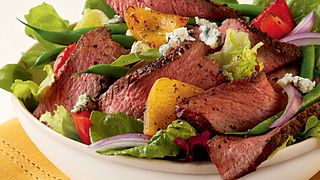Growing Up Strong: Prioritizing Critical Nutrients from Birth to Adolescence
The 2020-2025 Dietary Guidelines for Americans (DGA) emphasize the need to “make every bite count” with nutrient-dense foods. This guidance is particularly important at key life stages of rapid growth and development, including the early years and adolescence. Yet, as toddlers and teens experience periods of transition to greater autonomy in food choice, they face vulnerabilities related to healthy dietary pattern adherence. Many begin to encounter gaps for a constellation of essential nutrients, such as high-quality protein, iron, zinc, choline, and B vitamins, which are important for helping children reach their full health potential. Among these, iron is especially critical for physical growth and neurocognitive development. Despite its importance, adequate iron intake remains one of the most common nutrient gaps for both age groups, which can have significant detrimental, and in some cases, irreversible effects. And although animal-source foods, such as beef, are recommended by authoritative bodies as bioavailable sources of these nutrients, only 1% of infants are introduced to beef as a complementary first food between 6-9 months, and beef intake often drops among adolescents, especially teen girls.
Registered dietitian nutritionists can help educate parents and caregivers on how to close the gap on critical nutrient shortfalls and build a foundation that will lead to lifelong healthy eating patterns. Join nutrition researcher, Heather Leidy, PhD, and registered dietitians, Keith Ayoob, EdD, RDN and Marina Chaparro MPH, RDN, CDE, as they discuss the evidence behind beef’s role in healthy dietary patterns to cultivate and optimize wellbeing from the early years to adolescence. They’ll also address common misperceptions and help inspire ways to build balanced, nutrient-dense meals children will enjoy – to make every bite count from the beginning and through teenage years.
Learning Objectives:
After the webinar, participants will be able to:
- Identify critical nutrient gaps that exist during key life stages of rapid growth and development
- Examine beef’s nutrient profile as an animal source food to support healthy dietary patterns from infancy/toddlerhood through adolescence
- Develop nutrition recommendations to close nutrients gaps and optimize healthy growth and development
Continuing Education:
If you are a health professional seeking complimentary continuing education credits, check out the Beef Nutrition Education Hub. This webinar has been approved for 1 credit by the Commission on Dietetic Registration and you can download a continuing education certificate by accessing content through the Beef Nutrition Education Hub.


